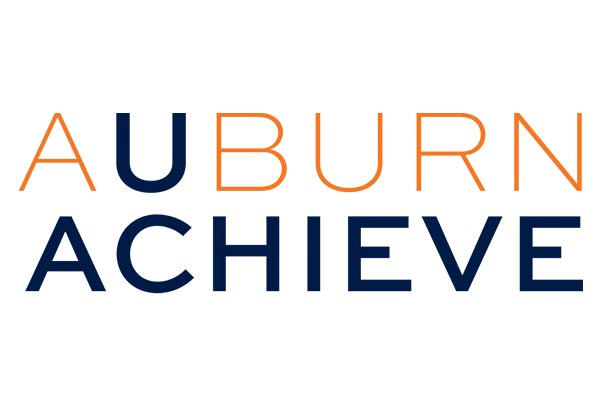Auburn launches AUBURNACHIEVE initiative designed to further career outcomes for graduates
Article body
Following months of collaboration between faculty, staff and students, Auburn University has launched a new initiative called AUBURNACHIEVE that is designed to further career outcomes among graduating students.
The endeavor is part of the university’s Quality Enhancement Plan, or QEP, which presents a university-wide plan for improving student success over five years and is a critical component of the university’s upcoming reaffirmation process by the Southern Association of Colleges and Schools Commission on Colleges, or SACSCOC. All institutions accredited by SACSCOC are required to assess student learning needs unique to their campuses and develop a comprehensive QEP to support student outcomes.
“While our SACSCOC accreditation ensures Auburn is fulfilling the charge of our land-grant mission, our QEP offers a more strategic focus on preparing our students for their chosen professions and improving the career outcomes of our graduates,” said Interim Provost Vini Nathan. “I am confident AUBURNACHIEVE will strengthen our ongoing efforts in this area as we continue to implement new academic initiatives and strategies that will benefit our students long after our accreditation is completed.”
Led by the Office of Academic Insight, the QEP reflects key elements of Auburn’s 2019-2024 strategic plan that places a considerable emphasis on student career outcomes. By using data-driven approaches designed to engage academic units, the project ensures the institution’s graduates are highly sought by industry, government, nonprofits and academia due to their experiences while at Auburn.
By taking advantage of the unique curricular and co-curricular differences offered across various academic departments, colleges and offices, AUBURNACHIEVEexplores campus engagement strategies and first-destination outcome data to allow units to become more strategic in preparing students for post-Auburn careers.
“Selecting first-destination outcome success as an area for strategic improvement and the topic for Auburn University’s next QEP is a natural next step, both because of the broad support voiced by multiple constituencies throughout the strategic planning process and because of Auburn University’s prior investment in collecting first-destination outcome data from all graduating seniors,” said Katie Boyd, director of the Office of Academic Insight and AUBURNACHIEVE.
In preparation for the first year of implementation, the Office of Academic Insight is currently establishing a framework that uses first destination outcome data to inform outreach with recent graduates. In addition, in fall 2021 the unit established the institution’s first Insight Lab. Staffed by educational researchers, the lab will facilitate applied research designed to help the campus community better understand student achievement and career success. Moreover, the unit has formed a QEP Advisory Council comprised of faculty representatives to support communication and programming.
Nominated by each dean’s office, the advisory council is composed of the following faculty representatives from each college:
- Amy Wright, chair, College of Agriculture
- Brenden Higgins, College of Agriculture
- Tom Leathem, College of Architecture, Design and Construction
- Jonathan Stanley, Raymond J. Harbert College of Business
- Margaret Flores, College of Education
- Robbie Barnes, Samuel Ginn College of Engineering
- Todd Franks, College of Forestry and Wildlife Sciences
- David Martin, College of Human Sciences
- Tom Lockhart, College of Liberal Arts
- Kelley Noll, College of Nursing
- Murali Dhanasekaran, Harrison College of Pharmacy
- Robert Boyd, College of Sciences and Mathematics
- Kelley Steury, College of Veterinary Medicine
Members of the campus community interested in learning more about AUBURNACHIEVE or the Insight Lab can contact Katie Boyd in the Office of Academic Insight.
Related Media
Media interested in this story can contact Communications Director Preston Sparks at (334) 844-9999 or preston.sparks@auburn.edu.
Auburn University is a nationally ranked land grant institution recognized for its commitment to world-class scholarship, interdisciplinary research with an elite, top-tier Carnegie R1 classification, life-changing outreach with Carnegie’s Community Engagement designation and an undergraduate education experience second to none. Auburn is home to more than 30,000 students, and its faculty and research partners collaborate to develop and deliver meaningful scholarship, science and technology-based advancements that meet pressing regional, national and global needs. Auburn’s commitment to active student engagement, professional success and public/private partnership drives a growing reputation for outreach and extension that delivers broad economic, health and societal impact.





